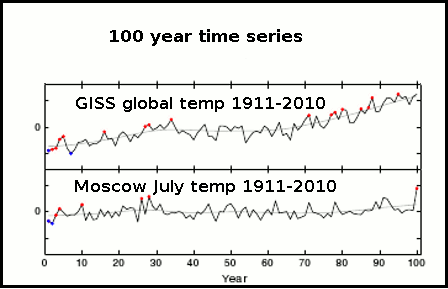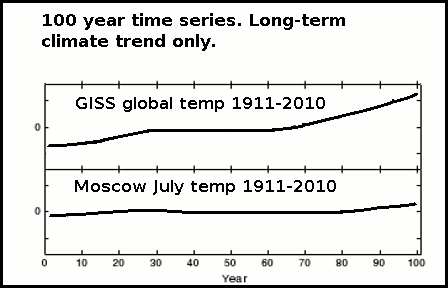Increase Of Extreme Events With Global Warming (Basic Version)
Posted on 11 November 2011 by Rob Painting
For a more technical version of this post, see here
It seems common sense that as the Earth warms we will see more record-breaking warm extremes, and less cold ones. What the authors of a recent study, Rahmstorf & Coumou (2011), sought to find out is how much of these extreme events can we put down to the slowly evolving change in climate, and how much is due to random variations in weather.
The authors developed a statistical approach to evaluate record-breaking events. They found that long-term warming increased the odds of record warm events in global temperature, and when applied to the 2010 monster summer heatwave in Moscow, Russia, they calculated an 80% probability the record-breaking heatwave would not have happened without climate warming.
Analogy time - if it floats your boat
Before going any further, a useful analogy here is to consider a boat moored in a marina. The incoming tide is our slowly changing component (warming climate), and waves are our rapidly fluctuating short-term component (weather). Over a period of time we measure the height of the boats mast, from the top of the jetty to which it is tied. Was the incoming tide responsible for the greatest recorded height?, or was it because of random wave action alone?
Rolling the dice
In order to find out how much each process (weather/climate warming) contributed to record-breaking extremes, the authors turned to Monte Carlo simulations. These are calculations in a computer program, where random numbers are run over and over again. The best way to think of this is rolling a dice. Rolling the dice once tells us nothing about the probability of rolling a six, but roll it 100,000 times (as in the experiment) and you can calculate the probability of a six turning up.
Using the actual data from both the NASA GISS global and July Moscow temperature observations (see figure 1) the authors carefully applied statistical analysis to strip out the weather component from the long-term nonlinear climate trend (see figure 2). The remaining long-term climate trend then gave them a template upon which they could run Monte Carlo simulations of the weather (this is comparable to stripping out the waves, in our analogy, and using the rising tide as a template, or backbone for wave simulations).

Figure 1 -GISS global, and Moscow July temperature time series 1911-2010. Both data sets have been normalized (i.e. scaled into a common refererence frame so comparison can be made). NB: Normalization (scaling) has the effect of making the change at Moscow look smaller than it actually is, due to very large annual fluctuations in temp. The long-term increase over the 100 year period is 1.8°C, more than twice the global average. Adapted from Rahmstorf & Coumou (2011).

Figure 2 - long-term trend only extracted from the GISS global, and the Moscow July temperature time series from 1911-2010 . Again, both data sets have been normalized. From Rahmstorf & Coumou (2011).
Planet Earth only rolls the weather dice once, but with the Monte Carlo simulation the authors were able to see what might happen if the Earth was able to do this over and over. By running the simulations with the added long-term climate trend, and without, the study authors were able to see how many times a record-breaking event pops up, and calculate probabilities.
And that other Russian Heatwave study?
The work of Rahmstorf & Coumou (2011) directly contradicts that of an earlier study on the 2010 Moscow heatwave (Dole [2011]). But it turns out that Dole (2011) failed to account for a glitch in the Moscow July station temperature data, which saw an urban heat island (UHI) correction erroneously applied. This was confirmed by checking with satellite temperature data. This over-correction mistakenly wiped out the warming trend and replaced it with a slight cooling trend. In our analogy that would be like assuming the tide fell, rather than rose. So it is little wonder that Dole (2011) came a different conclusion.
What are the odds?
Based on their statistical/analytical model, Rahmstorf & Coumou (2011) calculated that the climate warming of the last 100 years has increased the probability of record-breaking warm events in global temperatures, and in Moscow during July. In regard to the freak 2010 Moscow heatwave, (excluding 2010 temperatures) the authors estimated an 80% probability that the record would not have happened without the warming climate.































 Arguments
Arguments






























[DB] The graphic that Chris refers to is this one:
Figure 6. Jun-Jul-Aug surface temperature anomalies over land in 1955, 1965, 1975 and 2003-2011 relative to 1951-1980 mean temperature in units of the local standard deviation of temperature.